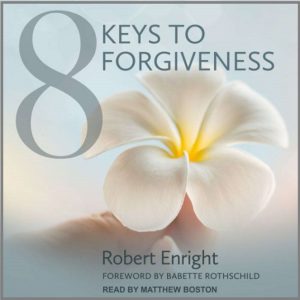Tagged: “forgiveness is a choice”
Power Versus Love
Current political norms seem to have power as a way to achieve objectives. In light of this, perhaps it is time to revisit the contrast between power and love. The following is an excerpt from the book, 8 Keys to Forgiveness (R. Enright, 2015).
Here are 10 pairs of contrasting statements differentiating between power and love, which may be useful in helping you forgive:
Power says, “Me first.”
Love asks, “How may I serve you today?”
Power manipulates.
Love builds up.
Power exhausts others.
Love refreshes them.
Power is rarely happy in any true sense.
Love understands happiness.
Power is highly rewarded in cultures that worship money.
Love considers money to be a means to an end, not an end itself.
Power steps on others.
Love is a bridge to others’ betterment.
Power wounds—even the one who exerts the power.
Love binds up the wounds, even in the self.
Power is joyless even when it is in control.
Love includes joy.
Power does not understand love.
Love does understand power and is not impressed.
Power see forgiveness as weakness and so resentments might remain.
Love sees forgiveness as a strength and so works to eliminate resentment.
Power rarely lasts because it eventually turns inward, exhausting itself. Look at slavery in the United States, or the supposedly all-powerful “Thousand-Year Reich” of the Nazis, or even the presence of the Berlin Wall, intended to imprison thought, freedom, and persons . . . forever. Love endures even in the face of grave power against it.
![]()
Sharing the Good News of Forgiveness!
Our founding board member, Dr. Robert Enright, has been busy with media interviews on forgiveness over the past months. Here is a listing of his interviews since December, 2023, starting with the most recent:
Live interview, The Drew Mariani Show (national), Relevant Radio, on the topic of betrayal, forgiveness, and self-forgiveness, March 27, 2024.
Interview with Darcy Sterling, “We Need to Talk” podcast, March 15, 2024.

Dr. Robert Enright
Interview with Julie Cruz, Well Wisconsin Radio Broadcast, March 13, 2024.
Interview with Laura Hearn, Flip It podcast, London, United Kingdom, March 12, 2024.
Interview with Rebecca Randall for a report in the John Templeton Foundation newsletter, March 4, 2024.
Live interview with Liz Saint John, KCBS radio, San Francisco, California, on the topic of forgiveness, December 27, 2023.
Interview with Julien Manuguerra-Patten, BBC’s Sideways program, United Kingdom, on the topic of holding grudges and forgiveness, December 11, 2023.
Live interview with Andy Moore, WORT-FM radio, Madison, Wisconsin, on the topic of forgiveness, December 8, 2023.
Live interview with Kate Archer Kent, “The Morning Show,” Wisconsin Public Radio, on the topic of forgiveness, December 6, 2023.
If you do a simple Google search for ‘Bob Enright Interview’, there are hundreds of thousands of hits! There are plenty of video, podcast, audio, and written interviews with Dr. Enright easily accessible across the internet and each of them helps shed light on forgiveness and its power to bring authentic peace and healing to people, communities, and the world. Check them out!
Dr. Enright discusses ‘Forgiveness is a Choice’ on Relationship Podcast
On April 2, 2024, Dr. Enright appeared on a one-hour podcast on YouTube, We Need to Talk with Dr. Darcy Sterling. Dr. Sterling is a New York City-based relationship therapist and host of E! Network’s Famously Single, who specializes in working with high-performance women who want to prioritize love and relationships.
Sterling describes her forgiveness journey that led her to interview Dr. Enright as follows on the YouTube video description:
“Years ago, I was gutted by a falling out with one of my siblings. It quickly became clear that we were on the verge of estrangement, and that impending loss brought me to my knees — I had just recovered from PTSD and was terrified of getting sucked into the black hole of trauma that I’d just come through.
Frantic for help, I found myself Googling a solution, and up came the term Forgiveness Therapy.
To be clear: I was not feeling forgiving. But I was feeling desperate. I did not want to revisit the darkness I’d just emerged from.
A book on forgiveness had recently been published by a professor named Robert Enright. In it he posits that forgiveness isn’t about cutting the other person slack. It’s a liferaft for people who feel wronged. Enright’s theory had been peer-reviewed — the gold standard in the field of psychology — so, despite my apprehension, I committed to following his program.
Today, my journey through forgiveness comes full circle in my conversation with the theorist himself, Dr. Robert Enright.
If you struggle with anger or are someone who holds grudges and you want to explore a solution, please listen to this episode.
In it, you’ll learn:
Why it makes sense if the thought of forgiving someone who wronged you makes you cringe.
The consequences of not forgiving.
How choosing to forgive puts you in control of your feelings.
How Enright’s program helped me to personally bypass a relapse of PTSD.”
Check out the interview below!
In Memoriam: A Tribute to Our Long-Time Board Member and Friend, Msgr. John Hebl
On March 11, 2024, our International Forgiveness Institute (IFI) lost our Board Member and friend, Msgr. John Hebl, who passed away at his home in Oxford, Wisconsin. He joined our IFI in 1994 and gave us 30 years of wonderful service with his wisdom and passion for forgiveness. He is an important figure in forgiveness science because he was the very first person, in the entire history of psychology, who did an empirically-based, peer-reviewed published study on a forgiveness intervention. In that article, published by the American Psychological Association’s journal, Psychotherapy, he screened 24 elderly women  who suffered injustices, mostly within the family and friendship contexts. He randomized the women into the experimental group, in which he brought them through our Process Model of Forgiveness, and the control group, in which social issues were discussed, such as the influence of senior citizens on society, attitudes toward aging, and family conflicts. Each lasted for eight sessions, once a week, for about an hour each time. Findings showed that the participants in the experimental group grew statistically significantly more than the control group participants in forgiving people who have hurt them. Those in the experimental group also grew statistically significantly more than the control group in their willingness to forgive others in general. The reference to this historical work is this:
who suffered injustices, mostly within the family and friendship contexts. He randomized the women into the experimental group, in which he brought them through our Process Model of Forgiveness, and the control group, in which social issues were discussed, such as the influence of senior citizens on society, attitudes toward aging, and family conflicts. Each lasted for eight sessions, once a week, for about an hour each time. Findings showed that the participants in the experimental group grew statistically significantly more than the control group participants in forgiving people who have hurt them. Those in the experimental group also grew statistically significantly more than the control group in their willingness to forgive others in general. The reference to this historical work is this:
Hebl, J., & Enright, R. D. (1993). Forgiveness as a psychotherapeutic goal with elderly females. Psychotherapy: Theory, Research, Practice, Training, 30(4), 658–667. https://doi.org/10.1037/0033-3204.30.4.658
Msgr. John was a dynamic, busy person as he led a Catholic parish and, at the same time, pursued successfully a doctoral degree in counseling psychology at the University of Wisconsin-Madison, where he did the groundbreaking research described above. Prior to this, he was a Brigadier General in the United States military service. I used to kid him, saying, “We all will have to address you as Father, Doctor, General Hebl!”
Rest in peace, Msgr. Hebl. Thank you for being a pioneer in forgiveness research, for serving people all these many years, and for contributing to a better world.
![]()
Finding Meaning As We Suffer
In recent months, the theme of suffering and finding meaning in that suffering has emerged more and more because of current events in the world, including the conflicts in Ukraine, in Israel and Gaza, and in Nigeria as examples. To reflect on the importance of finding meaning in suffering, we are reposting an essay first published here at the International Forgiveness Institute on October 15, 2013:
Let us start with the prophetic words of Shakespeare’s Macbeth, as he mourns the passing of Lady Macbeth in Act 5, Scene 5:

Image by Pexels.com
Tomorrow, and tomorrow, and tomorrow,
Creeps in this petty pace from day to day
To the last syllable of recorded time,
And all our yesterdays have lighted fools
The way to dusty death. Out, out, brief candle!
Life’s but a walking shadow, a poor player
That struts and frets his hour upon the stage
And then is heard no more. It is a tale
Told by an idiot, full of sound and fury,
Signifying nothing.
There is no meaning in life and therefore there is no meaning in suffering. To live and to suffer are meaningless. Yet, experience tells us that this kind of thinking is a dangerous illusion. Did Martin Luther King, Jr. have no meaning when he wrote his Letter from the Birmingham jail? Did Maximilian Kolbe see no meaning in life when he asked the Nazis to let him take the place of a condemned man who had a family? Whether one’s beliefs are in God or in random variations generated by mutations, we are either made for or have evolved toward finding meaning in our life. The skeptic would say that my point is a happy illusion: Yes, we need to believe this, but we do so just to stay alive; it is adaptive to think fairytale thoughts.
Yet, what else in nature can you identify that is so very important and at the same time is an illusion? I can think of nothing. If finding and having meaning is tied to our well-being, then there must be something to it. The psychiatrist Viktor Frankl, who survived Auschwitz (which Maximilian Kolbe chose not to survive for a higher good of protecting another person), observed this: Only those who survived Auschwitz found meaning in the profound suffering endured there. Those who found meaninglessness died. Finding meaning in this case was tied to positive, concrete outcomes. There was a need (to find meaning) that was fulfilled (surviving and even thriving). Can you think of any other real need that is not tied to something real that can fulfill it? If not, then it seems reasonable to say that we have real needs with real fulfillments and finding meaning and achieving the state of thriving are concretely, really linked together without illusion.
When we are treated deeply unjustly by others, we suffer. If we have come, through wisdom, to know the meaning of life, then we will find meaning in our suffering. If we find meaning in both life and suffering, we have the foundation to forgive well and to survive well the cruelty against us.
Sound and fury, signifying nothing? Please be careful in so concluding.
![]()



